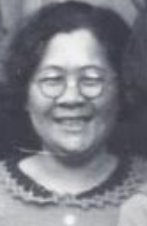Betsy Thung Sin Nio | |
|---|---|
| 汤新娘 | |
 Thung, circa 1930s | |
| Born | 22 May 1902 Batavia, Dutch East Indies, Kingdom of the Netherlands |
| Died | 5 January 1996 (aged 93) Eindhoven, Netherlands |
| Nationality | Dutch, Indonesian |
| Education | Nederlandsche Handels-Hoogeschool |
| Occupation(s) | Women's rights activist, physician, economist, politician, translator and teacher |
| Years active | 1930–1974 |
| Relatives | Phoa Keng Hek (cousin) Tan Sin Hok (cousin) |
Betsy Thung Sin Nio (Chinese: 汤新娘; pinyin: Tāng Xīnniáng, 22 May 1902 – 5 January 1996) was an Indonesian-Dutch women's rights activist, physician, economist and politician. Born into a wealthy and progressive Peranakan family of the 'Cabang Atas' gentry in Batavia, she was encouraged to obtain an education, which was unusual for Indonesian women at the time.[1] After completing high school, she qualified as a bookkeeper, but – because social norms prevented women from doing office work – she became a teacher. After teaching briefly in an elementary school, in 1924 Thung enrolled at the Netherlands School of Business in Rotterdam to study economics. On graduating, she went on to earn a master's degree and a doctorate in economics. In 1932, she enrolled at the University of Amsterdam to pursue her medical studies.
During her schooling in the Netherlands, Thung met Aletta Jacobs who encouraged her to become involved in the Dutch women's movement and the Association for Women's Interests and Equal Citizenship. She became an activist for improved socio-economic and civil status of women, writing articles for feminist journals in both the Netherlands and the Dutch East Indies. After completing her degree in 1938, Thung returned to Batavia and opened a medical practice focusing on the health needs of women and children. She continued her feminist involvement and fought for women's suffrage. When the government proposed only European women be given the vote and the right to stand in elections, she campaigned successfully to secure voting rights for educated women regardless of their race.
During World War II, Thung continued her private practice, volunteered at a local public hospital and opened a private hospital to treat European patients. When the war ended, she became a medical officer for the school system in Jakarta and entered local politics. She was elected as the first woman member of the Municipal Council of Jakarta in 1949, representing the Persatuan Tionghoa. From 1949 to 1965, she traveled abroad on numerous occasions on behalf of her country. She served as a translator for trade delegations and as an economist on fact-finding missions to Russia and China. Following the 1965 Indonesian coup d'état and the turn away from communism, she was released from government work. In 1968, when assimilationist policies were introduced to force Chinese citizens to take Indonesian names, Thung permanently immigrated to the Netherlands, where she continued to work as a physician. She formally sought naturalization in 1972 and in 1983 was knighted in the Order of Orange-Nassau. She is remembered in China, Indonesia and the Netherlands for her social activism on behalf of women and children.
- ^ Haryono 2017, pp. 187–188.